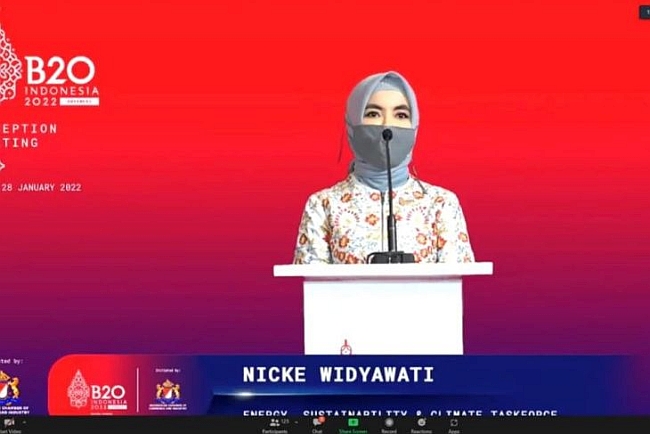– To be presented at the G20 high-level meeting in Bali in November 2022 –
The B20 Energy, Sustainability & Climate Task Force, led by the largest Energy State-Owned Enterprise in Indonesia PT Pertamina (Persero), has proposed three green energy transition recommendations to be presented at the G20 high-level meeting in Bali in November 2022.

The three recommendations were agreed upon during the Business 20 (B20) Inception Meeting held virtually at the end of January 2022, as noted in a release issued by PT Pertamina and received here on Thursday.
The Business 20, or B20, is an outreach group from the G20 that represents the international business community.
Chair of B20 Energy, Sustainability, and Climate Task Force Nicke Widyawati emphasized the importance for Indonesia to transition to green energy as mandated by President Joko Widodo.
According to Widyawati, the energy transition effort is a challenge for all, but it should also be viewed as an opportunity to create sustainable economic growth in future by implementing good established scenarios and roadmaps, especially with regard to the financial aspects.
“The B20 Energy, Sustainability and Climate Task Force has the same priorities as Indonesia’s G20 presidency in which we must be a strong green energy catalyst and go hand in hand with the principles of energy security, energy equity, and environmental sustainability,” Widyawati, concurrently the president director of state-owned oil giant Pertamina, stated.
She further noted that the Task Force will formulate some policy recommendations for sustainable energy transition, with focus on three priority issues.
- First, the Task Force will put forth the recommendation on accelerating transition to sustainable energy use in order to ensure that global warming is limited to a maximum of 1.5 degrees Celsius.With regard to such a recommendation, the main efforts identified for the energy transition policy is the development of alternative fuel industries around the use of hydrogen and biofuels.
- The second issue for recommendation is to ensure a fair and affordable way of transition as well as global cooperation on impact mitigation and support for adaptation to changes brought about by energy transition.
- The third is global cooperation in increasing energy security for households and MSMEs as a means to end extreme poverty and accelerate energy transition to sustainable energy use.
“Those three priority issues will form the basis for formulating policy recommendations from the Energy, Sustainability and Climate Task Force by considering other critical issues, such as carbon pricing, global cooperation, livelihoods, and institutional development for financing and technology adoption,” Widyawati explained.
She also stated that energy is a binding constraint for sustainable economic growth and is a crucial matter for economic development to recover from the impact of the COVID-19 pandemic.
She also emphasized that urgent and focused action was currently needed to address various global challenges, including the lagging rate of energy transition, climate change due to anthropogenic greenhouse gas (GHG) emissions that have become a critical issue, and economic growth depending on fossil fuel energy consumption that contributed to most of the GHG emissions.
Widyawati also pressed for expediting energy transition globally while continuing to increase energy security and equity in an effort to sustain economic growth and reduce extreme poverty.
In addition, the financing gap must be bridged and investment must be shifted more to the energy transition infrastructure that can be paid for by carbon pricing, she remarked.
Widyawati also accentuated the importance of ensuring energy equity by increasing access to and affordability of clean and modern energy that is not only essential for a successful transition but also delivers environmental and economic benefits.
“Renewable energy-based power generation, electrification, and energy efficiency are the main pillars for faster energy transition, technology investment, and energy transition sector,” she stated.
“However, developing countries still lack frameworks, well-established governance, markets, advanced financial services, trained workforce, and access to advanced technology. Those aspects are needed for changes (in energy transition), and all of them are owned by developed countries,” she remarked.
At the B20 Inception Meeting, the Task Force Deputy Chair Agung Wicaksono stated that in order to seek inputs from businesspersons, the Task Force had also conducted a survey.
The survey covers 13 potential issues: institutional development, global cooperation, alternative energy sources, differential rates per sector, prevention of new carbon lockouts, carbon pricing, mitigation of financial impact, mitigation of loss of livelihoods, standardized ESG frameworks, ensuring orderly transitions, increasing access, affordability and adoption of end-user technologies.
Wicaksono stated that the survey results became the basis for the Task Force to formulate recommendations.
He also acknowledged that the energy transition efforts will require structured and committed global cooperation in improving governance capacity, supporting market development, channeling finance and technology, and upgrading workforce skills.
“The spirit, hard work, and commitment of this meeting continues, and it will bring global change for the better after the COVID-19 pandemic, so that we can Recover Together, Recover Stronger,” he remarked.
Written by: Yuni Arisandy Sinaga, Editor: Fardah Assegaf (c) ANTARA 2022
Media Contact: Fajriyah Usman, Vice President Corporate Communications, PT Pertamina (Persero)
Mobile: +62 858 8330 8686, Email: fajriyah.usman@pertamina.com, URL: https://www.pertamina.com